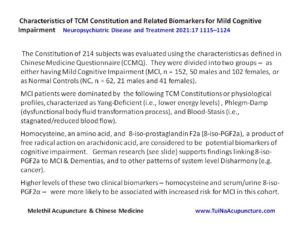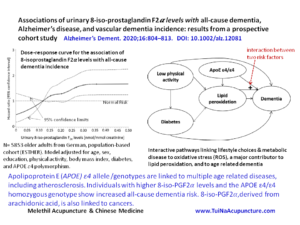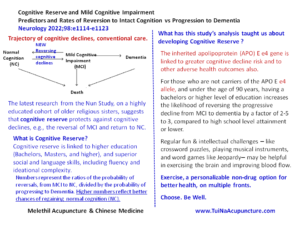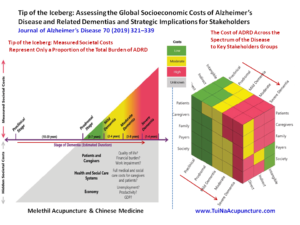Background
With better nutrition, and the effective management of infectious diseases, we are all living longer lives. The clinical research community has recognized that our healthcare systems, around the world, are not equipped to understand and manage the developmental processes associated with aging.
Llifestyle choices play an important role in slowing the developmental process we know as aging, as noted in a recent report from the China Cognition and Ageing Study. As the authors of an accompanying editorial note, “Ageing is accompanied by a decline in several measures of cognitive function, such as memory, reasoning, and psychomotor speed. Differences in the rate of change in cognitive function can be substantial between individuals, highlighting the importance of identifying modifiable factors that are associated with favourable cognitive ageing trajectories. An impaired cognitive status can affect the lives of individuals and their ability to live independently but this issue is also a hallmark of Alzheimer’s disease and related dementias.” 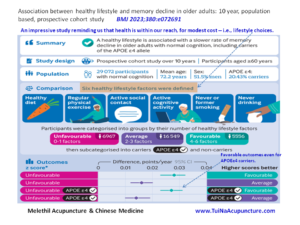
Starting early is best for those who would avoid suffering in later life.
Aging has become one of the contemporary social– economic issues that needs increased attention from clinical scientists, with the hope we can educate communities of biomedical doctors (MDs) and other providers of elder care with the information to help ease the burdens associated with the transitions of aging. The Alzheimer’s Association recently (2017) noted that formal (medical) and informal (family, friend caregiver) support are both in the hundreds of billions of dollars.
Mild cognitive impairments (MCIs), sometimes referred to as forgetfulness, and the dementias (e.g., vascular and Alzheinmer’s ) are some of the typical neurological diseases associated with aging. Over the last decade, I have reviewed over a hundred research articles on the subject on Cognitive Impairments and Dementias. It remains an active research frontier.
As with the cancers, degenerative neurological conditions often develop over decades. Therefore, it is important to avoid the conditions that lead to Disharmony within our bodies.
Disharmony is a nonspecific term used in many traditional systems of medicine, around the world, to speak of disease / illness that begins within the organ networks and physiological systems due to conflicts with one’s social (economic) environment. Our Psyche, our Heart-Mind awareness, is affected by chronic and persistent Disharmony.
In Western science, epidemiological research is paying increased attention to the socioeconomic status of marginalized communities. More specifically, the lack of Equity experienced by these cohorts. My research suggests that we should include people living in both the first and last two decades of life, in addition to the better recognized BIPOC and LGBTQIA+ communities.
Integrative Models of Neurodegenerative Processes
In traditional Chinese medical (TCM) theory, both Excess (Shi) and Deficient (Xu) constiutional patterns are linked to illness. Excess/Shi patterns,as the name implies comes about as a result of frequent overindulgences – e.g., trying to do to much work, consuming too much food or alcohol, every day. Deficient/Xu paterns come about due to constitutional weakness, such as those due to congenital factors, e.g., failure to thrive due to weaknesses in the digestive and respiratory systems, due to prolonged illness, due to recovery from a major accident, or due to aging.
As a progressive neurodegenerative disorder with cognitive dysfunction in the early prodromal stages, Dementia is often complicated by behavioral and psychological symptoms (BPS) including excitement, aggression, and hallucinations. Japanese clinicians have demonstrated the utility of a classic TCM formula to manage these patterns of behavior, seen in some patients with Alzheimer’s disease (AD).
Check out some of the recent findings for ideas on how to live healthy lives as we age. Some posts may also include more recent findings. Call the clinic about more specific ideas and personalized suggestions for wellness.
Reversing the MCI >> Dementia Transition
This promising work, based on long term observations of a group of Nuns, suggests that lifestyle choices, from early age onward, affects the cognitive development of an individual. More specifically, the acquisition and cultivation of Cognitive Reserve, a protective feature with respect to the ability to reverse the progression of Mild Cognitive Impairments to Dementia.
The Lancet Commission on Dementia Prevention, Intervention, and Care (2017) identified nine preventable risk factors for dementia– having little or no education, hypertension, untreated hearing impairment, smoking, obesity, depression, physical inactivity, diabetes, and low social contact. Emerging evidence has led the Commission to add head injuries, excessive alcohol consumption in midlife, and air pollution exposure in later life as contributing factors (2020).
Socioeconomic & Human Costs of Alzheimer’s disease (AD),related dementias (ADRDs)
Alzheimer’s disease (AD) and related dementias (ADRDs) are some of the costliest diseases in society, as noted by the Alzheimer’s Association. There is widespread concern that researchers and policymakers are not comprehensively capturing and discussing the full scope and magnitude of the socioeconomic burden of ADRDs, issues covered in some detail in this review.
